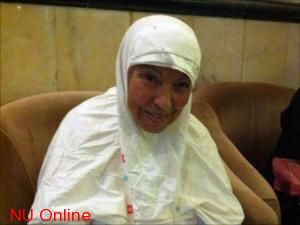Makkah, NU Online
Seeing the Ka'aba and Masjid al-Haram remains the main wish for millions of Muslims worldwide.<>
Yet, for Nafisa Al-Qurmazi, it was a far-fetched dream that came true after 18 months of darkness.
“When I came for hajj for the first time, I was certain that Allah Almighty would answer my prayers to regain my sight,” Nafisa said, Al-Madina newspaper reported on Saturday, October 19.
“All through my journey to Makkah, I had a dream of seeing Masjid al-Haram.”
A mother of three, Nafisa was one of the pilgrims who had the chance to perform hajj this year.
The 70-year-old pilgrim lost her sight around a year and a half ago when she suffered a brain blood clot.
When Nafisa flocked with around two million Muslims to `Arafat, also known as “Mount of Mercy”, she did not know that she was about to witness a turning point in her life.
Chanting "Labbaik Allahumma Labbaik (Here I am answering Your call, O God)," the pilgrims follow the lead of Prophet Muhammad (peace and blessings be upon him) to Arafat, where the Prophet delivered his last sermon more than 14 centuries ago.
Pilgrims spend the day on the plains of `Arafat in the most essential pillar of hajj.
Staying at the area specified for Tunisian pilgrims, she suddenly found herself able to see the colors of her tent and the faces of other pilgrims surrounding her.
“Allah answered my prayers and I was able to see again in the most sacred area in the world, in Arafat,” she said.
The miracle of the elderly Tunisian woman is not the first during this year’s hajj.
Sudanese pilgrim Fatima Al Mahi also regained her sight last week while staying at Prophet’s mosque in Al-Madinah.
Fatima said that she was staying at Prophet’s mosque when she started to see the light she had been deprived of for the past seven years.
Every year, Makkah hosts millions of Muslims from around the world pouring to perform hajj, one of the five pillars of Islam.
Pilgrims usually drink from the blessed Well of Zamzam which has been gushing for thousands of years.
Allah created the Zamzam well to provide Hajar, the wife of Prophet Ibrahim (Abraham), and her baby son Isma`eel with water in the hot, dry valley of Makkah.
In her desperate search for water, Hajar ran seven times back and forth in the scorching heat between the two hills of Safa and Marwa to provide for her thirsty baby.
The act remains a necessary rite all pilgrims must complete.
Prophet Muhammad (peace be upon him) has recommended drinking from the blessed water, saying it serves whatever purpose it is being used for.
Islam also teaches that in the case of physical sickness we should adopt the best available medical treatment as well as praying to Allah.
The command to pray is relevant not only in the case of physical sickness, but also in the case of all human endeavors.
This is because we are incapable of achieving anything on our own, without the help of God, the One and Only Creator and Sustainer of all.
Editing by Sudarto Murtaufiq
Terkait
Terpopuler
1
Panduan Shalat Gerhana Bulan Petang Ini, Mulai Niat hingga Salam
2
PBNU Instruksikan Qunut Nazilah Respons Agresi Israel-AS ke Iran
3
Jadwal Cuti Bersama dan WFA Lebaran 2026, Total Libur Capai 16 Hari
4
Ketua Umum PBNU Mengutuk Serangan AS-Israel atas Iran
5
Khutbah Gerhana Bulan: Tanda Kekuasaan Allah dan Kesempatan Beramal Saleh
6
Amalan-amalan yang Dianjurkan ketika Terjadi Gerhana Bulan
Terkini
Lihat Semua



